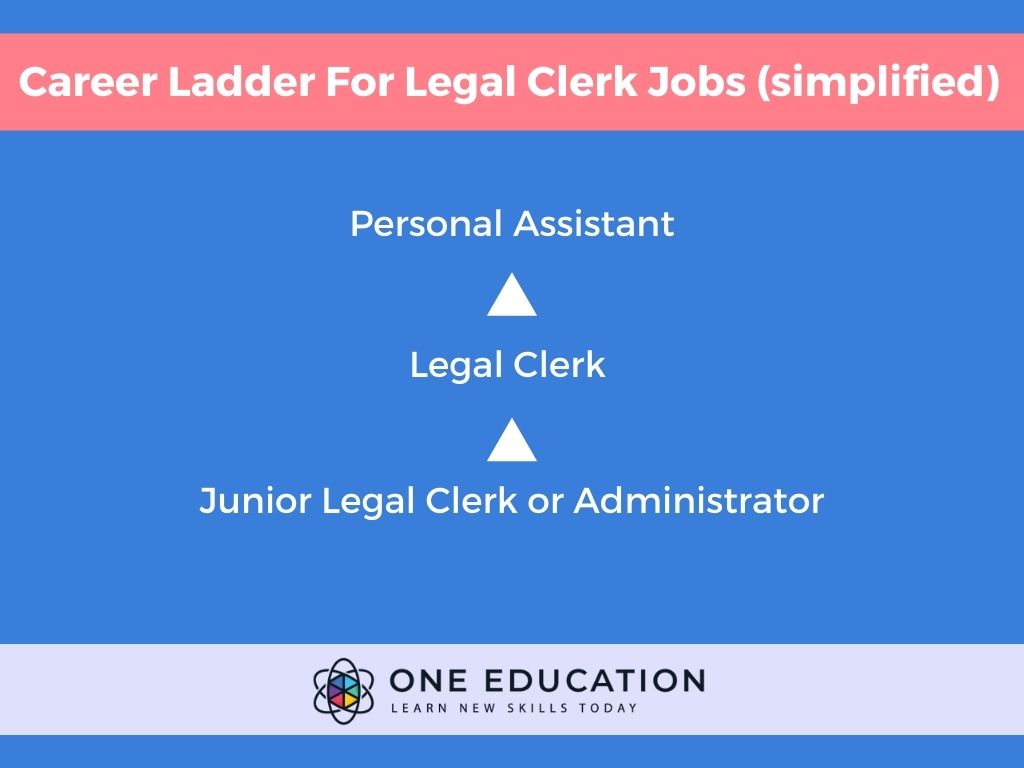Do you know that you have a career opportunity in law fields even without an academic degree? Also, you can earn a decent amount of money annually. Yes, you do so by becoming a legal clerk. In the UK, the average annual salary of a legal clerk is around £25,000, and in future, they have the opportunity to earn up to £45,000.
However, the duties and responsibilities are enormous. Also, sometimes you may have to handle them alone without any help from others. You need specific skills and training to perform them smoothly. Therefore, stick to the article to learn everything related to the legal clerk career.
Table of Contents
Who is a Legal Clerk?
A legal clerk provides administrative support for solicitors, barristers and legal executives. In addition, they produce legal letters and documents on behalf of their employers, such as wills.
What are the Duties and Responsibilities of a Legal Clerk?
Like other office jobs, the duties and responsibilities of a legal clerk are versatile, and they vary accordingly. As a legal clerk, you will be providing se
cretarial and administrative support to Lawyers and Legal Executives.

Your day-to-day duties and responsibilities will include:
- Producing letters and legal documents, for example, contracts, wills, and court papers.
- Keeping records up to date.
- Answering telephone calls with professional finesse.
- Working and collecting information from notes and digital dictation.
- Dealing with clients’ enquiries via email, fax, and letter.
- Using a diary management system and making appointments for your employer.
- Preparing court forms and statements.
- Keeping records of costs and controlling petty cash.
- Dealing with clients for fee processing and others.
- Attending court or visiting police cells occasionally.
- Delivering and collecting documents from court, clients and others.
- Copying, scanning and faxing letter and legal document, including preparation of large files.
- Filing the documents and other general administrative work in the office.
If you work in a small and local law firm, you will have considerable responsibility and duties. There is a big chance you will have to handle everything on your own. As a result, it may take a toll on your health. However, you will develop experience in a wide range of legal matters.
What Skills will you need to Become a Legal Clerk?
There are many specific skills that a legal clerk requires to do their day-to-day tasks and responsibilities. The responsibilities and duties of a legal clerk vary according to the location and employer. It is not always the same; in big firms, you will handle one specific area of laws. In contrast, in small law firms, you may have to specialise in many areas of the laws. To perform day-to-day tasks, you will need quite a few skills.

However, you will be working in an office; therefore, you will need standard office-related skills. Also, you have to acquire knowledge about laws to work as a legal clerk. Some such important qualities are:
- Having excellent face to face communication and interpersonal skills. These skills are essential in dealing with clients, solicitors, barristers, court officials and judges.
- Being excellent at organising and planning documents. A legal clerk often has to handle several cases at different stages concurrently.
- Having good computer skills. For example, typing skills, you will need to type at a decent speed (45-60 words per minute).
- Having excellent negotiation skills.
- Having a natural tendency to pay attention to detail and accuracy.
- Being able to absorb a lot of information, for example, from a meeting with clients.
- Being aware of appropriate language and etiquette. Also, how to use them, especially in court.
- Having good telephone skills and strong written communication skills.
- Having commercial awareness and sales skills.
- Being reasonably knowledgable of the different areas of law.
- Being excellent in working under pressure.
- Having the ability to work well with others and exhibit leadership skills when necessary.
What are the Working Hours of a Legal Clerk?
Most legal clerks work regular hours like other office jobs. They usually work from 9 am – 5 pm and 36-38 hours a week. However, there are often some part-time positions available for those who are looking for flexible work.
You will be spending most of your time in the office area. Although, sometimes, you may have to attend the court hearing and visit the police station occasionally.
What is the Salary of a Legal Clerk?
Well, like other office jobs, the salary of a legal clerk is not fixed. As a legal clerk, you may earn between £18,000 and £45,000. Also, there are many opportunities for you to make more money by diversifying your work. However, it depends on your experience, skills, working location and employer.

Although the average salary of a legal clerk in the UK is around £25,000 annually, the starting salary of an unskilled junior legal clerk without any academic degree is £18,000. After gaining the experience, your salary will start to increase, earning the average wage.
However, if you have an academic degree related to the law, you will find a job more efficiently. Also, you will get a decent starting salary.
Is it the Right Profession for You?
A career opportunity in legal fields can be very satisfying and rewarding. You will be working indoors and will often have a hectic schedule. Every day you will get to meet a lot of people and do various tasks. Every day is a new adventure for some people, and some people might find this profession boring.

Therefore, before jumping into a career as a legal clerk, you need to consider if it is the right profession for you. Ask yourself the following questions to find the answer to ‘is it the right profession for me?’:
- Are you able to do the daily tasks and duties? (Given that the responsibilities are quite a lot in volume.)
- Do you have the necessary skills to become a legal clerk?
- Can you learn and understand complicated legal jargon and procedures?
- Are you good with people since you have to communicate with clients and colleagues?
- Can you handle the long working office hours?
- Last but not least, is the salary enough for you?
If you are good with everything above and have the skills mentioned above, you should become a legal clerk. Read on to learn the ways you can become a legal clerk.
How to Become a Legal Clerk?
The first thing you need to know is that you don’t require an academic degree to become a legal clerk.

However, an academic degree or training can help you in getting a job in a short time. You can get into this profession through:
- A college course.
- An apprenticeship.
- Working towards this role.
- Specialist courses run by a professional body.
College
You can become a legal clerk by taking a college course. In a college course, you will learn the necessary skills and knowledge needed for this job. In addition, a college degree will help you tremendously in finding a job right after graduating.
To become a legal clerk, you could take a diploma course in:
- An audio transcription course,
- A legal word processing course, or
- A qualification course, for example, a Accounts Clerk Training Course (Bookkeeping) – Level 1
Entry requirements for a college course
You will usually need:
- 4 or 5 GCSEs at grades 9 to 4 (A* to C), or equivalent, for a level 3 course.
Source: National career service.
Apprenticeship

Another way to become a legal clerk is through an apprenticeship program. You can take an intermediate and advanced apprenticeship in legal services. However, you will be starting with a lower salary range compared to the others who have an academic degree.
Entry requirements
You will usually need:
- For an intermediate apprenticeship: Some GCSEs, usually including English and maths, or equivalent.
- For an advanced apprenticeship: 5 GCSEs at grades 9 to 4 (A* to C), or equivalent, including English and maths.
Source: National career service.
Work
You could start your career as a junior legal clerk or admin assistant with a legal business or organisation. After acquiring the necessary experience, apply for a trainee position. However, you will need excellent word processing skills for a trainee legal clerk job. Your word processing skill should be 45-60 words per minute.
Other routes
There are many specialist courses available online that can fulfil your dream to become a legal clerk. These courses are run by a professional body that is excellent in this field. For example, you can take a Accounts Clerk and MS Excel Course offered by One Education. It is created by excellent trainers who are top in their field, and you can learn from this course at your own pace.
You have learned about the duties, skills, working hours, and salary of a legal clerk. Also, you have known about the different ways you can become a legal clerk. Are you wondering, what career improvement opportunities you will have if you pursue the career? Then read on!
What are the Career Prospects for Legal Clerks?
The types of job vacancies available to a legal clerks are as diverse as the establishments they work for. However, the legal clerk jobs can also be expressed in a simplified form. You can see the diagram below for getting a very basic idea:

After achieving the necessary qualification, you can start your career as a junior legal clerk. While working there, you will continue to gain experience and also improve your skills to rise through the career ladder.
Also, if you like the legal law profession, you can take an additional degree in the law-related subject and become a paralegal or even a lawyer.
Ending note
If you like a systematic approach to work and are interested in law, becoming a legal clerk might be the best career choice. However, the daily duties and work pressure are vast. Therefore, you will need a lot of dedication and skills to do your everyday work. Also, you will need to continue learning and improving skills and law jargon.
So, are you ready to become a legal clerk? If you are, then don’t delay in getting started with our enriched courses at One Education. That could create the gateway for a very successful career ahead of you.
Recent posts
- The Impact Of Remote Work On Women In The Marketing Industry
- 5 Reasons Why You Should Pursue a Cybersecurity Career
- Differentiating Web Design and Web Development
- Top 10 Social Media Management Tools for Businesses in 2024
- Why is Child Development so Important in Early Years
- Line Management: How to be a Good Line Manager?
- How Long Should a Health Sector Career Take?
- The Importance of BSL in Everyday Life
- Why Corporate eLearning is Essential for Organisational Training
- Take your Business Expertise to the next level: Get your MBA







 August 05, 2023
August 05, 2023








